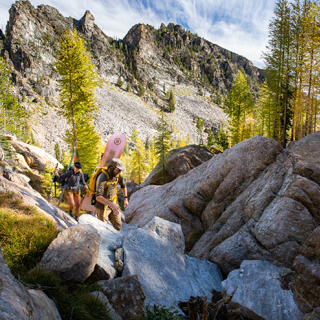Faculty Research Labs
Bark Beetle Ecology & Evolution - Diana Six
Research on everything from evolution to ecology to management and effects of global change, and from the micro- to the landscape level, mainly focused on bark or ambrosia beetles and their interactions with fungi
Ecosystems Lab - Ben Colman
Testing the drivers and patterns of C and nutrient cycling in ecosystems from polar to tropical, terrestrial to aquatic, and fresh to salty
Faist Lab - Akasha Faist
Our research is primarily focused on identifying and overcoming barriers in ecological restoration. Understanding these potential barriers and constraints can help us effectively direct our efforts to ensuring restoration success. Within this framework, our lab’s research encompasses multiple fields including plant, soil, and rangeland ecology as well as soil-seed bank studies and native seed-based restoration.
Fish Ecology and Conservation Genomics - Andrew Whiteley
Research linking genetic and genomic factors with other aspects of an organism’s biology, life history, and demography to help predict population persistence, focusing primarily on fishes.
Forest Landscape Ecology Lab - Solomon Dobrowski
The lab focuses on three core areas of research: 1) understanding physiographic influences on climate, 2) modeling and estimating uncertainty in species distribution models (SDMs), and 3) understanding fire and fire effects.
Global Climate and Ecology Laboratory - Ashley Ballantyne
Research focused on interactions between the biosphere and the atmosphere and how these interactions alter Earth’s climate. We are interested in how climate affects the biogeochemical cycling of important elements and in turn how biogeochemical cycles have the potential to alter climate. Our research focuses on feedback mechanisms that have the potential to alter climate from regional to global scales and over a range of timescales. In our research we rely on observations and models to gain insight into how biology and climate are inextricably linked in the Earth System.
Human Dimensions Lab - Alex Metcalf & Elizabeth Covelli Metcalf
Applied research on human interactions with the environment, educational opportunities for students exploring the intersection of biophysical and social processes and strong partnerships with landowners, industry, agencies, nongovernmental organizations and the public.
PaleoEcology and Fire Ecology Lab - Phil Higuera
Understanding the interactions among climate, vegetation and fire regimes over a range of spatial and temporal scales, in the past, present and future
Population & Disease Ecology - Angie Luis
Research at the intersection of population, community and disease ecology, with particular focus on the importance of host ecology in determining disease dynamics in wildlife
Quantitative Wildlife Ecology - Paul Lukacs
Research on the development and application of quantitative methods to ecological problems, primarily in wildlife population dynamics
Restoration Ecology Lab - Cara Nelson
Research on 1) effects of large-scale disturbance on understory plants and trees, 2) conceptual basis for ecological restoration, 3) efficacy and ecological impacts of restoration treatments, and 4) sampling methods for detecting changes in understory plant abundance
Terrestrial Biogeochemistry Lab - Cory Cleveland
Research on how terrestrial ecosystems function, how they are being affected by human activities, and the consequences of environmental change for both humans and the ecosystems that we depend on
Ungulate Ecology Lab - Mark Hebblewhite
Research on understanding 1) how wildlife such as ungulate herbivores balance the costs of predation with the benefits of foraging, and 2) how human activities influence this balance, and the ensuing conservation and management consequences to wildlife population dynamics
Water & Society Lab - Brian Chaffin
Exploring the social and biophysical processes that define the human-water relationship
Wildland and Recreation Management Research Lab - Will Rice
Research on recreational use in parks and protected areas to provide wildland managers with social science to improve the experiences of all visitors while preserving the ecosystems that support those experiences
